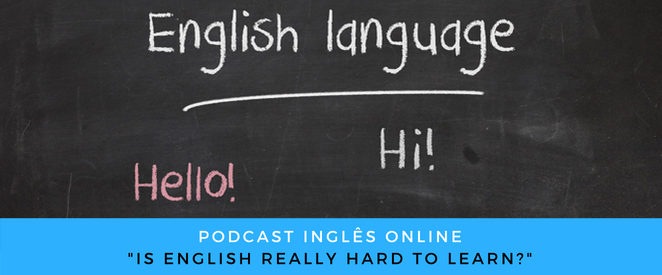I totally agree with you!!
This maybe seems a little childish, but I hate Portuguese!!!!! It’s really very difficult and boring, but in ther other hand I really love English, actually I still have a lot to learn, but at least I enjoy studying!
Thanks, everyone for all the great comments!!
Hi there, Ana!
I have been reading all material showed here and learned a lot. The lessons have great content about grammar, slangs, pronunciation and so on. About the language be hard to learn isn´t true, because Chinese, Portuguese, Latim, German and others ones are more difficult than English. I think that the idiom have many levels, then be hard or easy will depend where you want to go. That is it. Congrats Teacher Ana Luiza, you have been doing a great work.
I think that what í´ve read in this text express exactly what really heappens when you are learning english. Everything seems to be hard, every exception is pretty hard and we think that we are never going to learn. Bur if we think about portugues, how many exceptions do we have? Definily I prefer to have to learn english than portugues!!!!! We already have a very hard language, I think that learn english is so much more than keep the rules in the mind, but it is practice to know how to speak in every situation. That´s the reason I think that musics, films, tv shows help us a lot!!!!
If you like english to learn english is easier and until funny, but if don´t like and have to learn just because of work you will have a big problem.
Yes, Patricia ;) And it’s kinda interesting to reflect on – we became fluent in Portuguese just like that ;) and sometimes a foreign language seems like such a hard goal to achieve as an adult. Interesting, to say the least…
in fact learning plurals isn´t that difficult, using the rule of simple present in the 3rd person of singular you can, by guessing learn most of the exceptions, actually I don´t know how to explane exactly what I mean, though it works with me, I hope you´ve got it.
Hello…
I just love this site….and I would like to hear you talking about an expression that is frequently used in portuguese and I don´t about english…that it is: “estou torcendo por você” I think there is something close to it in english…I´ll keep my fingers crossed for you…but I´d like to hear if there´s something else???
thanks a lot…
Yes, Edvaldo, I’ve made a post about “fingers crossed”. There are other ways, such as “we’re rooting for you” ou “cheering someone on” (= encorajando, animando alguém)
Well. I’ve been studying English for a While and also reading/listening to inglesonline since more than a year for now and I love all your tips . I must tell you that I just discovered I’m more interested in studying English than Portuguese because I think it is easier. I don’t know why, but I’m quite comfortable to say this: I’d rather study English than Portuguese. Portuguese has so many rules, exceptions. Much more than English. In English many words have a connection with the meaning. This also happens in our language but it’s from far more common in English. Therefore, English becomes really hard to learn when it comes to its accent. But that occurs with Portuguese anyway, I guess. If you speak grammatically correct, but without the right accent , you may not be understood. That’s my opinion.
Yes, rosi, agreed on the pronunciation differences…
So something that would really help in my experience is to listen to small pieces of audio over and over, and really notice the pronunciation of a few individual words. Over time, it gets easier (especially as we “let go” a little, meaning, when we relax ;)
Well, everytime that someone says something like that, I say: think in out language, there are a lot of rules, so much more than in English, and it’s amazing, however difficult sometimes.
I’m sorry, but in this time I don’t have any idea beyond yours.
Thanks for your great job.
PS: your pronunciation is always fantastic, one day I’m gonna get there
Thanks, André. Enjoy ;)
I forgot to mention before, but I think it would be great if there were a space to let comments on your podcasts in your application. See you.
Já tem, Ricardo – é o FÓRUM MOBILE!
Hello, Ana! I’ve been listening to your podcasts for a long time and I only need to congrat you for them. Although I already use another android app to download podcasts, I decided to try yours too. I think it’s pretty good and useful, especially for someone who does not have another podcast manager program or who wants to have your material at their hands quickly. Have a good holiday! Bye
Great, Ricardo. Hope the app’s working well for you!
Desde que comecei a aprender inglês passei a admirar a simplicidade desta língua quando comparada com o português, sobretudo na conjugação verbal.
I think what makes english a trick language to learn is its pronunciation. To master them all, as you said, only by getting too much exposure to it.
I’m completely agree. It’s very difficulty learn english pronunciation. Words like live, for example, could be pronounced as ‘laive’ (adj.) and as ‘live’ (verb). And what about words like: thought, through, tough, enough, policy, police, politician, chemical… :(


